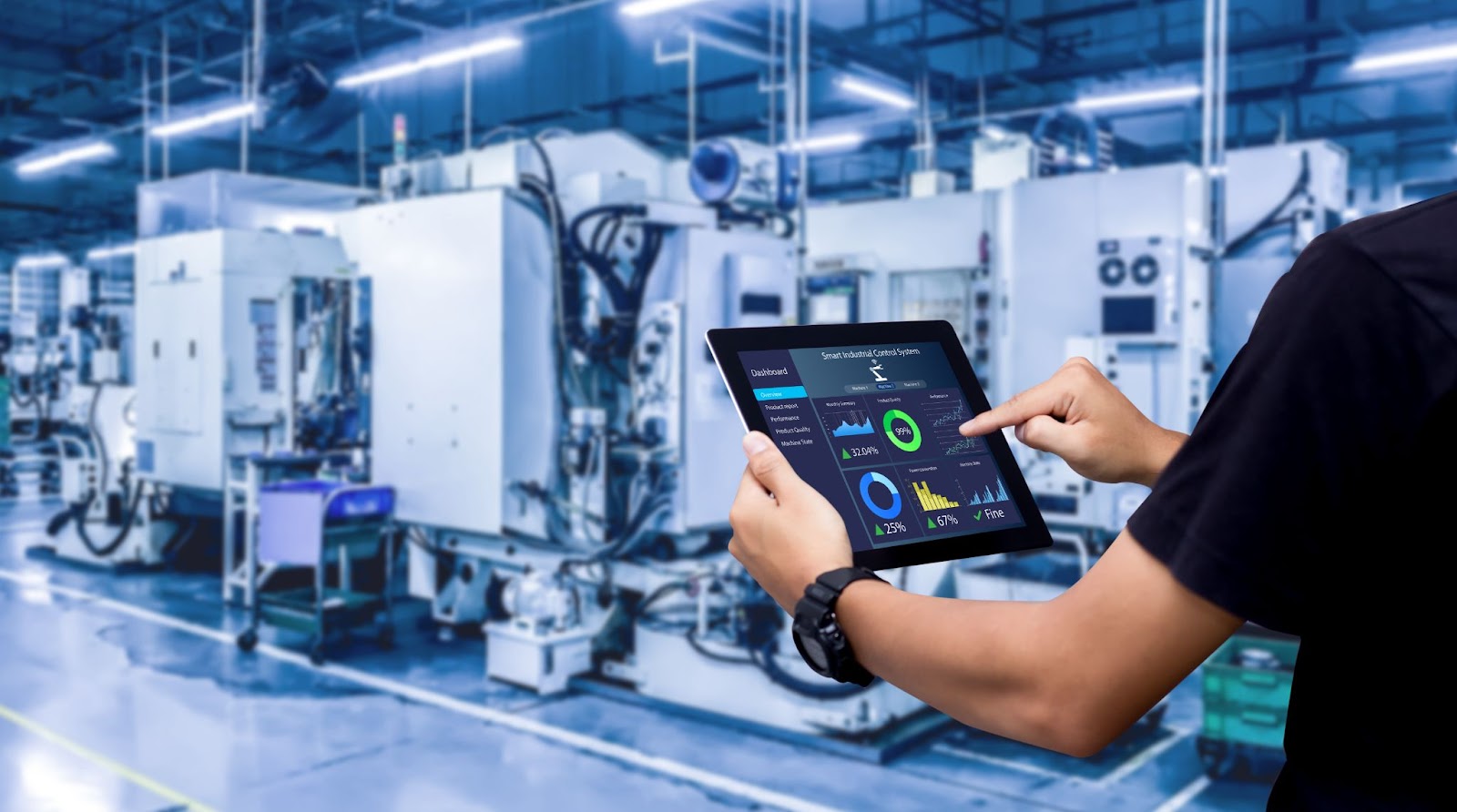.png)
Smart factory solutions have emerged as a game-changing approach that's revolutionizing how production facilities operate. These intelligent manufacturing systems integrate cutting-edge technologies like IoT, AI, automation, and data analytics to create connected, responsive production environments.
If you've been wondering whether smart factory solutions are worth the investment, this article explores the five most compelling benefits that are driving their adoption across industries worldwide.
What Makes a Factory “Smart”?
Before diving into the benefits of implementing smart factory solutions, let's quickly understand what makes a factory "smart." A smart factory leverages digital technologies to create an environment where machines and systems communicate and make decisions with minimal human intervention. This interconnected ecosystem continuously collects and analyzes data to optimize operations, predict maintenance needs, and adapt to changing requirements in real-time.
Now, let's explore the top advantages these intelligent manufacturing systems bring to the table.
The Top 5 Benefits of Implementing Smart Factory Solutions
1. Increased Efficiency and Productivity
Smart factory solutions are transforming productivity levels across manufacturing operations. By harnessing the power of automation, real-time monitoring, and data-driven decision making, companies are seeing remarkable improvements in their output and resource utilization.
Traditional factories often struggle with workflow bottlenecks, equipment downtime, and inefficient resource allocation. Smart factory solutions address these challenges head-on by creating a synchronized production environment where every machine, process, and worker operates at optimal capacity.
For example, when a manufacturing line experiences an unexpected slowdown, smart systems can immediately identify the cause and either resolve it autonomously or alert maintenance teams with specific troubleshooting guidance. This quick response prevents the minor issues from escalating into major production delays.
2. Quality Control and Reduced Defects
Perhaps one of the most valuable benefits of implementing smart factory solutions is the dramatic improvement in product quality and consistency. Traditional quality control methods often rely on random sampling and human inspection, which can miss defects and lead to costly recalls or customer dissatisfaction.
Smart factories employ sophisticated sensors, computer vision systems, and AI-powered analytics to monitor product quality at every stage of production. These technologies can detect microscopic flaws or deviations from specifications that would be invisible to the human eye.
What makes this approach particularly powerful is that it's preventative rather than reactive. Smart factory quality systems don't just catch defects – they help prevent them from occurring in the first place by identifying process variations that could lead to quality issues down the line.
For instance, a smart factory producing electronic components might use thermal imaging to detect minute temperature fluctuations during assembly that could indicate potential failures. The system can automatically adjust parameters to bring the process back into the optimal range before any defective units are produced.
This comprehensive approach to quality management not only reduces waste and rework costs but also enhances brand reputation and customer satisfaction – benefits that extend far beyond the factory floor.

3. Flexibility and Customization Capabilities
Today's consumers increasingly demand personalized products, and traditional manufacturing processes often struggle to deliver customization without sacrificing efficiency. This is where implementing smart factory solutions offers a tremendous competitive advantage.
Smart factories excel at what industry experts call "mass customization" – the ability to produce customized products at near-mass production efficiency. Through modular production lines, programmable automation, and seamless integration with design and ordering systems, smart factories can switch between different product variants with minimal downtime.
This flexibility extends beyond product customization to market responsiveness. When consumer preferences shift or new opportunities emerge, smart factories can quickly adapt production schedules and configurations to meet these changing demands.
A furniture manufacturer implementing smart factory solutions, for example, might be able to produce custom-sized tables in various finishes and styles within the same production line that previously could only handle standardized products. The digital controls and automated tool changes make product transitions smooth and efficient.
This adaptability represents a significant competitive advantage in today's fast-moving markets, where being first to respond to trends can make the difference between leading the market or playing catch-up.
Also Read: Manufacturing Staff Management in the Age of AI and Automation
4. Cost Savings Across Operations
While implementing smart factory solutions requires upfront investment, the long-term cost savings are substantial and multifaceted. Smart factories optimize nearly every aspect of the operation that impacts the bottom line.
Energy costs often decrease significantly as smart systems monitor consumption patterns and automatically adjust settings to minimize waste. Some facilities report energy savings of 20-30% after implementing intelligent power management systems.
Labor costs become more efficient as automation handles repetitive tasks, allowing human workers to focus on higher-value activities that require creativity, problem-solving, and decision-making. This doesn't necessarily mean fewer jobs – rather, it often means more productive and fulfilling roles for the workforce.
Maintenance expenses drop through predictive approaches that prevent costly breakdowns and extend equipment lifespan. By analyzing performance data, smart systems can identify when machines are likely to fail and schedule maintenance during planned downtime rather than dealing with emergency repairs during peak production periods.
Inventory carrying costs decrease as well, with smart factories maintaining optimal material levels based on real-time production needs and demand forecasts rather than keeping excessive safety stock "just in case."
When combined, these various cost reductions significantly improve profit margins while enabling more competitive pricing strategies – a win-win for manufacturers and their customers.
5. Enhanced Sustainability and Workplace Safety
The final major benefit of implementing smart factory solutions addresses two critical concerns for modern manufacturers: environmental impact and worker safety.
Smart factories are inherently more sustainable than their traditional counterparts. Their precise control over processes minimizes waste of raw materials, water, and energy. Advanced monitoring systems track resource consumption and emissions in real-time, helping manufacturers meet environmental regulations and sustainability goals.
For example, a smart chemical processing plant might use IoT sensors to continuously monitor water usage and automatically adjust processes to minimize consumption while maintaining product quality. Similar systems can optimize energy use by powering down non-essential equipment during low production periods.
Worker safety also improves dramatically in smart factory environments. Dangerous or physically demanding tasks can be handled by automated systems, while connected wearables and environmental sensors can alert workers to potential hazards before accidents occur.
Digital work instructions and augmented reality systems ensure that employees have the information they need to perform tasks safely, while AI-powered monitoring can detect when safety protocols aren't being followed and intervene accordingly.

Also Read: How a Factory Management System Can Cut Costs and Improve Productivity
Conclusion
The benefits of implementing smart factory solutions extend far beyond operational improvements – they represent a fundamental shift in how manufacturing creates value in the modern economy. By combining efficiency, quality, flexibility, cost-effectiveness, and sustainability, smart factories enable manufacturers to meet the complex demands of today's markets while preparing for tomorrow's challenges.
As technology continues to evolve and implementation costs decrease, smart factory solutions will become increasingly accessible to manufacturers of all sizes. Those who embrace these innovations now will gain a significant competitive advantage, positioning themselves as leaders in the next era of industrial production.
Whether you're a global manufacturer or a specialized local producer, exploring how smart factory solutions can transform your operations is no longer optional – it's essential for long-term success in an increasingly digital, connected, and demanding marketplace.


.svg)



.jpg)



.svg)
.svg)
.svg)
.png)

.png)